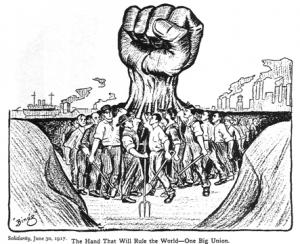In my recent post, Hurting Labor Unions is Wrong [1], your humble servant endeavored to demonstrate that the holding of the U.S. Supreme Court in Janus v. State, County, and Municipal Employees [2], that requiring non-union members to pay an “agency fee” to cover the cost of representation in collective bargaining violates the First Amendment, was in conflict with Catholic social teaching.
Now it has been observed that the Janus case has essentially imposed a “right-to-work” regime on all government employment. “Right-to-work” otherwise comes in the form of state legislation, prohibiting businesses and labor unions from entering into contracts whereby all employees are required to become union members. Thus union membership cannot be made a condition of employment in right-to-work states.
 It is ironic that legislation of this kind tends to be supported by those with libertarian leanings, since it is really a restriction on private contract terms. Those who would argue that employment terms should consist of whatever employers and individual employees agree to will often be advocates of right-to-work laws, which dictate what may not be in an employer’s contract with a union. Of course, it is beyond a reasonable doubt that the real intent behind right-to-work legislation is to weaken labor unions, so it should not be surprising that such a shameless contradiction would be so brazenly engaged in. Politics, sad to say, is not about philosophy and reason, but control of resources.
It is ironic that legislation of this kind tends to be supported by those with libertarian leanings, since it is really a restriction on private contract terms. Those who would argue that employment terms should consist of whatever employers and individual employees agree to will often be advocates of right-to-work laws, which dictate what may not be in an employer’s contract with a union. Of course, it is beyond a reasonable doubt that the real intent behind right-to-work legislation is to weaken labor unions, so it should not be surprising that such a shameless contradiction would be so brazenly engaged in. Politics, sad to say, is not about philosophy and reason, but control of resources.
As it turns out, Catholic social teaching has something to say on the subject.
In his encyclical, Quadragesimo anno, Pope Pius XI described a solution to the conflict between labor and capital that avoids the extremes of unregulated capitalism and socialism, which he described this way:
“The civil authority itself constitutes the syndicate as a juridical personality in such a manner as to confer on it simultaneously a certain monopoly-privilege, since only such a syndicate, when thus approved, can maintain the rights (according to the type of syndicate) of workers or employers, and since it alone can arrange for the placement of labor and conclude so-termed labor agreements. Anyone is free to join a syndicate or not, and only within these limits can this kind of syndicate be called free; for syndical dues and special assessments are exacted of absolutely all members of every specified calling or profession, whether they are workers or employers; likewise all are bound by the labor agreements made by the legally recognized syndicate. Nevertheless, it has been officially stated that this legally recognized syndicate does not prevent the existence, without legal status, however, of other associations made up of persons following the same calling.
 “The associations, or corporations, are composed of delegates from the two syndicates (that is, of workers and employers) respectively of the same industry or profession and, as true and proper organs and institutions of the State, they direct the syndicates and coordinate their activities in matters of common interest toward one and the same end.
“The associations, or corporations, are composed of delegates from the two syndicates (that is, of workers and employers) respectively of the same industry or profession and, as true and proper organs and institutions of the State, they direct the syndicates and coordinate their activities in matters of common interest toward one and the same end.
“Strikes and lock-outs are forbidden; if the parties cannot settle their dispute, public authority intervenes.” (Id, §§92-94) [3]
The idea is that there will be two syndicates for each industry: one for the employers, and one for the employees. The syndicates of an industry send delegates to an industry association, which tries to coordinate activities and resolve disputes. The government steps in when disputes cannot be resolved. The one feature that is critical to the present discussion is that while one is free to join his proper syndicate or not, he is still required to pay dues to the syndicate representing him.
Under a right-to-work regime, by contrast, the employee who chooses not to join a union also frees himself of the obligation to pay dues. In Janus, the plaintiff complained that he was required to pay an agency fee, not even full dues, to cover the cost of his being represented in collective bargaining, and he prevailed on free speech grounds.
Right-to-work legislation cannot be squared with what Pius XI promoted in Quadragesimo anno, and, therefore, neither can Janus. Whatever virtues one might claim for such arrangements, there is simply no support for it in Catholic social teaching. And those of us who are Catholic ought to be interested in that.
The icon of St. Joseph the Worker is by Daniel Nichols.
Listen to Christian Democracy on live internet radio on Tuesdays at 10:30 p.m. Eastern time at WCAT Radio here, or listen to the podcast here on the Christian Democracy Patheos blog.
Please go like Christian Democracy on Facebook here. Join the discussion on Catholic social teaching here.












